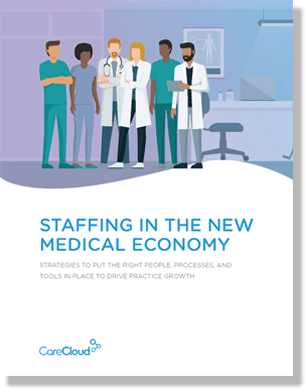There is no shortage of acronyms in the healthcare world. Your practice is expected to juggle letters the way it does numbers on patient financials, and so some of the more fashionable three-to-five letter combos may have slipped beneath your radar.
Accountable care organization, or ACO, ranks high in the list of trendy shortenings, yet its definition still eludes many a physician. Sure, it’s a payment model of some sort – some call it alternative, others claim it’s impossible. CMS can help you with a definition if you’re having trouble, seeing as they’re providing ACO parameters on the fly.
The only question should be whether or not ACOs actually work for your practice, and how they’ll support the influx of health IT initiatives you’ll be adopting within the next few years. We dive into the implications of ACOs below in an attempt to answer both questions.
ACOs and Your Practice
At first glance, ACOs are simple enough to process, at least at surface level – they make providers responsible for clusters of patients, while CMS continues to pay individual healthcare providers as it does under Medicare and develop benchmarks to determine whether an ACO qualifies to receive shared savings.
Money-saving ACOs that hit helpful goals for patients are offered rewards by participating insurers, although they may risk losing a significant amount of money if their costs run higher than expected.
The goal? Eliminate duplicate services and treatment.
Marsha Gold, a researcher at Mathematica specializing in ACOs, underscores contingencies as to how ACOs will affect small practices.
“Impacts will depend on how they work out,” said Gold. “[The relationship] is likely to enhance interest by ACO sponsors in practices being able to have EHRs that connect and support analysis of care across settings.”
ACOs can benefit small practices. In fact, joining an ACO could mean you won’t have to sell your practice to a larger institution for financial support while still taking advantage of large system perks.
But what happens when some physicians in a region are invited to an ACO and some are not?
“This can be expected because ACOs may be built around specific hospital systems and physicians vary in their affiliations,” said Gold, dismissing the fear mongering of ACO opponents.
Another oft-cited fear questions whether ACOs will make hospitals want to purchase more practices. Gold believes this apprehension is at least partly unwarranted.
“The discussion from the field suggests that hospitals increasingly are acquiring practices, with ACOs as one contributing factor,” said Gold. “But this varies by market and system.”
Regardless, your practice should begin considering how it should change to be prepared for CMS’ final regulations.
ACOs and Health IT
The relationship between ACOs and health IT initiatives is important, considering the ominous 2015 EHR adoption deadline binding all practices and hospital systems in the United States.
In her 2010 policy brief on ACOs, Gold discussed aligning ACO incentives with additional initiatives, which brings up the question: can practices align ACO incentives with advances in healthcare IT, namely EHRs, telemedicine and mobile technologies?
For one, ACOs require new analytic, clinical workflow and administrative functions for them to reduce costs and enhance patient care. Sometimes, these functions can’t be fully accommodated by EHRs, HIEs or other hospital IT systems.
Data for an ACO needs to report on trends in clinical and claims data, support traditional care and administrative processes and manage shared information across multiple providers, i.e., ACO-wide managed problem and medical lists, care plans and directories of identity and privacy settings.
Then, of course, there’s another issue Gold pointed out for us. With regards to health IT initiatives, “practices can’t align very easily unless purchasers align their requests and payments. Consistent performance metrics, financial incentives across payers and programs are valuable in this regard.”
As a practice manager or physician, do you like the idea of ACOs, or are you not convinced?



